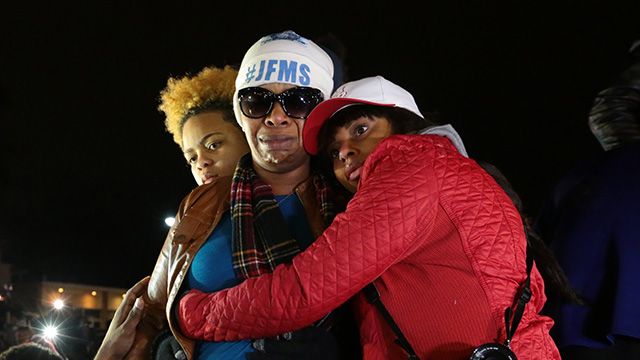
Last night’s announcement of a Missouri grand jury’s decision not to indict Officer Darren Wilson in the August killing of the unarmed Michael Brown has triggered a deluge of commentary and analysis throughout the media. Here are a few of the pieces we’ve been reading since today’s edition of Morning Reads that we thought would be of interest to the readers of BillMoyers.com.
For the basics, The New York Times offers a useful, interactive, “What Happened in Ferguson?” It’s a Q and A that’s a concise but thorough summary of the events to date.
At Slate, Jamelle Bouie writes, “It would have been powerful to see charges filed against Darren Wilson. At the same time, actual justice for Michael Brown — a world in which young men like Michael Brown can’t be gunned down without consequences — won’t come from the criminal justice system. Our courts and juries aren’t impartial arbiters — they exist inside society, not outside of it — and they can only provide as much justice as society is willing to give.”
Writing at the Campaign for America’s Future blog, Terrance Heath calls for economic justice and an end to racial profiling by police, adding, “Law enforcement officers in every department in the country should be required to undergo racial bias training. These departments must prioritize diversity in the hiring and retention of officers, and be accountable to the public. We must demand an end to programs that give military weapons to police departments.”
Rashad Robinson, executive director of ColorOfChange, agrees that “our justice system has failed us once again. And the serious problems plaguing law enforcement… put us all in danger,” but in a commentary for the New York Daily News, he adds this note of hope: “Unlike the days of the Rodney King video, we no longer have to wait for mainstream media to validate our stories. A new generation of activists has emerged, adept at using tools like cellphones and social media to amplify issues of police misconduct in Ferguson and nationwide. Their voices, stories and unwillingness to remain silent have made this a national moment for change.”
Jaeah Lee and Erika Eichelberger at Mother Jones have gleaned half a dozen “revelations” from the grand jury documents. Over at Vox, Ezra Klein has read Officer Wilson’s grand jury testimony and offers his thoughts. “Unbelievable things happen every day,” Klein concludes. “The fact that his story raises more questions than it answers doesn’t mean it isn’t true. But the point of a trial would have been to try to answer these questions. We would have either found out if everything we thought we knew about Brown was wrong, or if Wilson’s story was flawed in important ways. But now we’re not going to get that chance. We’re just left with Wilson’s unbelievable story.”
Journalist’s Resource has an excellent compendium of research on law enforcement and racial conflict in the wake of Ferguson. Nicole Flatow at ThinkProgress offers this account of seven others who have been killed by police in the weeks since Ferguson. And AP reports that “the grand jury’s decision to spare police officer Darren Wilson from criminal charges is the latest in a long line of police shooting investigations that show the latitude afforded law enforcement in using deadly force.”
Carol Anderson, an associate professor of African American studies and history at Emory University, suggests in a superb Washington Post op-ed piece that what has happened in Fergsuon and elsewhere is not about African American anger at police but white anger against progress. “Protests and looting naturally capture attention,” she notes. “But the real rage smolders in meetings where officials redraw precincts to dilute African American voting strength or seek to slash the government payrolls that have long served as sources of black employment. It goes virtually unnoticed, however, because white rage doesn’t have to take to the streets and face rubber bullets to be heard. Instead, white rage carries an aura of respectability and has access to the courts, police, legislatures and governors, who cast its efforts as noble, though they are actually driven by the most ignoble motivations.”
Just to further roil that dynamic, at The Atlantic, Robert P. Jones, CEO of the Public Religion Research Institute, updates a piece from August analyzing polling data and noting that “the chief obstacle to having an intelligent, or even intelligible, conversation across the racial divide is that on average white Americans live in communities that face far fewer problems and talk mostly to other white people… Widespread social separation is the root of divergent reactions along racial lines to events such as the Watts riots, the O.J. Simpson verdict, and, more recently, the shootings of Trayvon Martin and Michael Brown.”
Worth a look back: In October, St. Louis magazine offered a revealing, deeply candid conversation among local residents titled, “Race in St. Louis: Bridging the Divide.” The page also links to a variety of articles, statistics, interviews and even a reading list on the history of segregation in the city.
And for additional background, read the interview BillMoyers.com’s Josh Holland conducted last month with the Economic Policy Institute’s Richard Rothstein, whose report, “The Making of Ferguson,” details how, Josh wrote, “throughout the last century a series of intentionally discriminatory policies at the local, state and federal levels created the ghettos we see today.”


